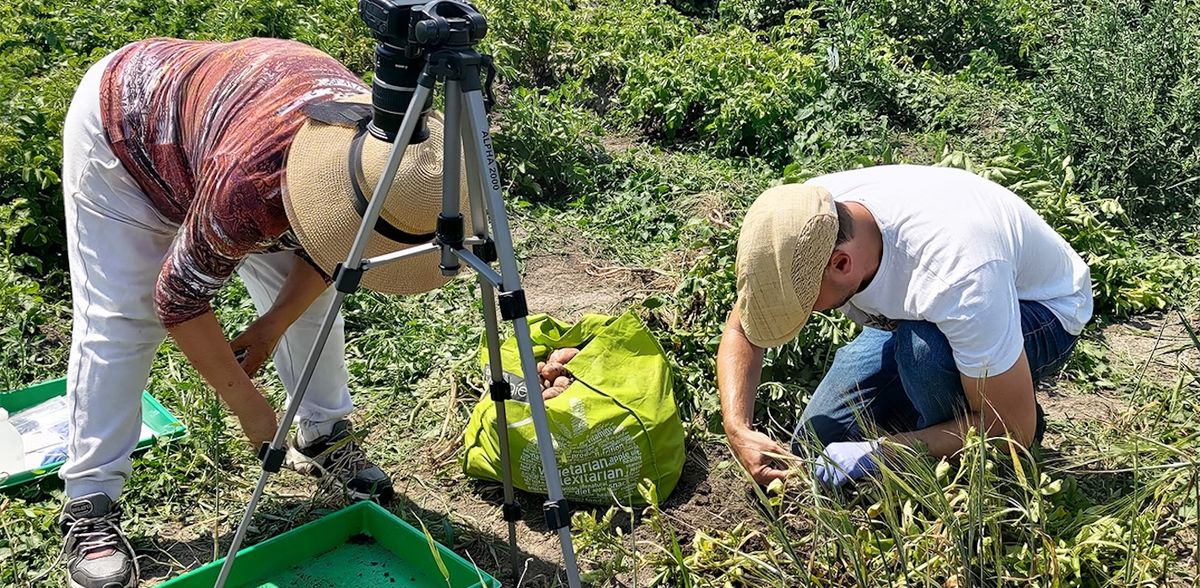How "stressed" potatoes become climate-ready
Stress reactions of the potato due to climate change investigated to adapt future breeds
Advertisement
Heat, drought and flooding - nature is under stress, and so is the potato. As a staple food, there is a particular interest in making potatoes climate-ready. An international team led by the University of Vienna has now investigated how this can be achieved in the four-year EU project ADAPT. The scientists were able to define specific properties and molecular reactions that could be decisive for future potato breeding. The new breeding findings are to be put into practice in a follow-up project.
The potato is one of the most important food crops in the world. A major problem for the future security of tuber yields and the high quality of this staple food is the susceptibility of potato plants to heat and drought, which are occurring more and more frequently together or in succession due to climate change. Heat and periods of drought are often followed by regional flooding caused by heavy rainfall, which can destroy the entire harvest within a few days. Until now, little was known about how the potato reacts to this multiple stress.
After four years of intensive research, an international team led by the University of Vienna is now providing important basic knowledge to make the potato climate-ready. The scientists have gained valuable insights into how potato plants react to heat, drought and waterlogging as a result of flooded fields. They took samples at critical growth phases of the potato plants and carried out measurements in order to research specific properties and molecular adaptation reactions that will be helpful for the future breeding of better adapted potato varieties.
"In our field trials with around 50 varieties, which we carried out at various climatic locations from Spain and Serbia to Austria and the Netherlands, we were able to identify clear differences in the yield stability of individual varieties: Many varieties often produced higher yields under optimal conditions, but under the sometimes extreme stress conditions of recent years, it became apparent that varieties with usually somewhat lower yields were particularly yield-stable under stress conditions. The question now is what makes these varieties significantly better able to cope with extreme drought and heat," explains cell biologist and project leader Markus Teige from the University of Vienna.
To this end, the field trials were supplemented by experiments in greenhouses, in which the stress conditions can be precisely regulated and where it is also possible to test novel research lines in which reactions to stress can be observed at a cellular level - virtually "live". By examining the samples from these experiments, the scientists were able to observe changes in metabolism based on patterns of gene expression, hormones or metabolites. In turn, they were able to identify specific signatures for stress tolerance or susceptibility. The scientists have thus created a valuable basis for the development of markers for the future breeding of potatoes.
The EU ADAPT project combined the complementary expertise of ten leading academic research institutions, four potato breeders, a screening technology developer, an agency and an EU non-profit association to explore the mechanisms underlying resistance to multiple stresses in potato. "It was this combination that allowed us to tackle these complex challenges at such a high level, building on the needs of the community/stakeholders. In my opinion, this is the right way forward for future research into more climate-resilient crops and should be pursued in future projects," says Teige.
Note: This article has been translated using a computer system without human intervention. LUMITOS offers these automatic translations to present a wider range of current news. Since this article has been translated with automatic translation, it is possible that it contains errors in vocabulary, syntax or grammar. The original article in German can be found here.
























































